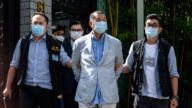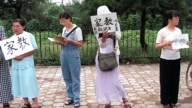【新唐人2012年1月19日讯】北京国家统计局公布,中国去年第4季度GDP增速放缓到8.9%,去年全年GDP增速达9.2%。《路透社》、《美联社》等国际媒体认为,中国今年上半年经济增速仍处于探底过程中,但可望实现“软着陆”。而另有媒体和学者则担忧中国经济今年可能出现“硬着陆”。
在1月17号的国务院新闻办发布会上,统计局局长马建堂表示,2011年尽管GDP增速在逐季回落,但在很大程度上符合宏观调控的目标。
马建堂说,2011年,国际金融危机的影响仍在继续,对2012年经济发展要有忧患意识。
“纽约城市大学”经济学教授陈志飞表示,中共一贯报喜不报忧,马建堂的提醒显示形势严峻。
陈志飞:“说明中国经济现在下滑的倾向,已经不是表面的贴贴补补、数据造假能够掩盖的,整体结合起来可以得出一个结论,就是中国的经济现在形势还是非常严峻的,的确是令人担忧的。”
商务部18号公布,2011年欧美对华投资有所下降,美国投资同比下降26.07%。欧盟27国投资下降3.65%。
英国《卫报》12号引述“法国兴业银行”经济战略负责人爱德华兹的分析说,中国很可能在2012年出现“硬着陆”,把全球经济危机引向高潮。爱德华兹警告说,中国经济在过去20年以大约10%的平均年增长率扩张,但是在西方出现二次探底经济危机、以及中国本身出现房地产市场过热的情况下,中国经济未来可能面临严重的问题。
陈志飞:“随着今年欧债危机进一步深入,中国经济只会再遇更大的挑战。从国内来看,房地产的泡沫以及其他制造业、还有带动经济发展的其他方面整体萎缩,也会使中央政府一筹莫展,再加上还有挥之不去的梦魇通货膨胀,整个造成了一个中国经济无法跳出的怪圈。”
统计局最新数据显示,中国城镇人口在历史上第一次超过农村,占中国13亿总人口的51.3%。
马建堂认为,人口结构的变化对促进内需将起到积极作用。他不认为地方债务和房地产是中国经济运行最大的风险。
北京经济学家冯兴元则表示,中国的GDP依然是靠政府投资和行政主导来拉动,与市场经济背道而驰。今年上半年房地产业可能出现大洗牌,顶不住限购措施的民间投资将会退出。
冯兴元:“去年由于限购措施出的比较多,影响到GDP总体的规模和增长率。它这个增长率是通过国进民退的方式保持 的,比如说大力的发展保障房,它实际上还是更增加政府投资的形式,来维持GDP的这样一个成绩。”
按照统计局公布的GDP总额计算,2011年中国人均GDP为5000多美元。“复旦大学”经济学院副院长孙立坚认为,如果考虑通胀和汇率因素,人均GDP是否增长还有待商榷,甚至不排除有下滑的趋势。
“北京大学”国民经济核算研究中心研究员蔡志洲指出,2010年,中国人均GDP排名位列世界第95位,去年的水平也就和非洲纳米比亚2010年的差不多。德国《明镜》周刊评论说,对于中国来说,这几乎是一个临界值;不断增长的富裕阶层,需要与较低收入者共享成功,否则难避免大的社会动荡。
新唐人记者常春、李元翰、孙宁采访报导。
2012: “Hard Landing" for China’s Economy?
Beijing’s National Bureau of Statistics revealed China’s GDP
growth in the fourth quarter slowed to 8.9% from 9.2% in 2011.
Reuters and Associated Press believe China’s economic growth
this year is still falling, but is expected to have a “soft landing."
Other media and academics are worried that China’s economy
this year may actually experience a “hard landing."
On January 17, at the State Council Information Office
press conference,
Chief of Bureau of Statistics, Ma Jiantang spoke about
China’s GDP growth.
Ma said, despite its decrease in 2011, GDP growth
was largely in line with macro-control goals.
Ma Jiantang commented that 2011’s global financial crisis
should invite concerns about 2012’s economic development.
Chen Zhifei, Professor of Economics from City University
of New York, said, the Chinese Communist Party (CCP) always reports the good rather than the bad news.
Ma Jiantang’s remarks are actually a reminder
of the severity of the situation.
Chen Zhifei: “There is a trend of decline in China’s economy
now. The surface fixes and false data can’t be hidden anymore.
Overall, the conclusion is that China’s economy
is still in a very grim situation, which is indeed worrying."
On January 18, the Ministry of Commerce announced that
China’s 2011 European and American investments declined.
US investments decreased 26.07%.
Investments from the EU decreased 3.65%.
On January 12, The Guardian cited Albert Edwards (Head of
economic strategy from the French bank “Societe Generale").
His analysis showed, China is likely to face a “hard landing"
in 2012 which will lead to the global economic crisis’ climax.
Edwards warned that the Chinese economy expended with
about 10% average annual growth over the past 20 years.
But with the two touches of the economic bottom in the West
and China’s overheated real estate market,
China’s economy may face serious problem in the future.
Chen Zhifei: “With the further deepening debt crisis in Europe
this year, China’s economy will encounter greater challenges.
From a domestic perspective, the real estate bubble
and overall decline of manufacturing industries,
as well as other aspects promoting economic development,
will make the CCP unable to do anything.
Plus the inflation, they all make a cycle,
which China’s economy cannot jump out of."
Bureau of Statistics’ latest figures show that China’s urban
population reached 51.3%, exceeding the rural population,
This is for the first time in China’s history.
Ma Jiantang believes that changes in population structure
will play a positive role in promoting domestic demand.
He does not think that local debt and real estate
are the largest risks of China’s economic performance.
Beijing economist, Feng Xingyuan, said that China’s GDP is
still dominated by the government’s investment and administration,
which runs counter to the market economy.
In the first half of 2012, real estate may experience
a major reshuffle.
Private investments unable to withstand restriction measures
will quit.
Feng Xingyuan: “Last year, the restriction measures affected
the overall size and growth rate of GDP.
The growth rate is kept in the way of national development
and people’s regression.
For example, the development of protection housing is in fact
a form of increasing government investment to maintain GDP."
According to the released GDP from Bureau of Statistics,
in 2011, China’s GDP per capita is 5,000 dollars.
Sun Lijian, Vice President of Economics at Fudan University
believes, GDP per capita is still questionable, and can have a downward trend.
Cai Zhizhou, Research Center of National Accounts from
Peking University pointed out that in 2010,
China’s GDP per capita ranked 95th in the world.
And that China’s last year figure was almost the same
as that of Namibia, Africa, for 2010.
Germany’s Der Spiegel commented that for China,
this is almost a critical value.
The growing wealthy class needs to share the success
with lower income class, otherwise, it will be difficult to avoid a great social upheaval.
NTD reporters Chang Chun, Li Yuanhan and Sun Ning.





























